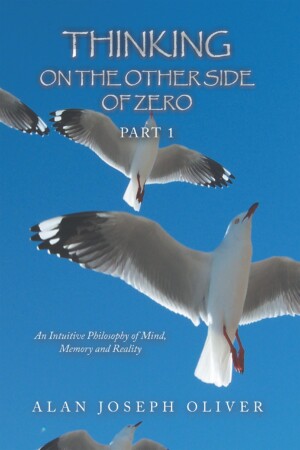Title: Thinking on the Other Side of Zero: An Intuitive Philosophy of Mind, Memory and Reality
Author: Alan Joseph Oliver
Publisher: XlibrisAU
ISBN: 978-1669888031
Pages: 188
Genre: Non-Fiction
Reviewed by: David Allen
Pacific Book Review
Turns out that ‘big fat Zero’ is more than a digital place holder – much, much more. Zero is the crossroads where the ancient wisdom of Patanjali’s sutras meets the modern dispensations of particle physics, strange assumptions, and cosmology.
Readers will delight in the harvest of personal experience, philosophy and science offered in this book. Alan Joseph Oliver, the author of Thinking on the Other Side of Zero: An Intuitive Philosophy of Mind, Memory and Reality, is a healer who presents a fascinating perspective informed by homeopathy, channeling and meditation and by top drawer discussions of Reiki, remote healing, and the implications of ‘non-local’ counterintuitive phenomena.
Quantum physics and thought experiments strongly suggest certain ‘anomalies’, the electron, that marvel of ambiguity, can probably exist in two places at once. Attempts to measure the location of things including subatomic particles like electrons are invariably complicated by the presence of the ‘objective’ observer.
Like it or not, there is no objective observer. He/she/it went out sometime last century, on a jolly relativistic stroll with Einstein and Heisenberg. Other names – David Bohm, Rupert Sheldrake – came up along the way. Sheldrake, was a thought champion – a cult figure of sorts – whose ‘morphogenic fields’ kicked off continuing scientific and philosophic debate, How explain so-called ‘action-at-a-distance?’ How explain that learning (in lab animals, in people, perhaps in all living things) taking place in one part of the world might be instantaneously transferred to living things on the other side of the planet?
The key concepts are ‘non-locality’: non-local consciousness – and action-at-a-distance. On a subatomic level, changes in one member of a particle pair result in immediate changes in a second (remote) particle. Gravitylikewise defies imagination here, its effect on distant bodies being immediate, no time lapse whatsoever! Lose the notion of brain – physically-based mind and the fear of non-existence melts away.
Oliver ties these considerations into his healing work, and into all healing work in general, expansively and impressively. If mind can exert remote effects, efforts at ‘remote’ healing are validated. What are the sutras of Patanjali? Witness: Author Oliver is a master influencer – readers will want to explore these diadems on which so much of Yoga, mind meditation, and transpersonal psychology is based.
Oliver explains: Within the sutras we can find a model of reality, which encompasses the world of both classical physics and quantum mechanics. Where this model differs from modern thought is in its inclusion of both consciousness and God. My view is that consciousness, mind and memory are NOT phenomena that arise from the chemical and electrical activity within biological processes of the brain.
Oliver asks, Have you ever felt someone’s eyes on the back of your head? Or perhaps you may have known who was on the phone, even before you lifted the receiver? Science terms these moments of knowing ‘anomalies.’ More to the point, phenomena such as these alert us to the possibility of ‘group think’, ‘collective unconscious’, and remote healing. If any of these phenomena – alternative healing, clairaudience, clairviewing, other forms of action at a distance – are real, the implications are so vast and mind-blowing that books such as this merit on-going attention and study. Regardless, Oliver’s Socratic method gifts us with a guided tour of philosophy, epistemology, and meaning that is genuinely erudite yet reader-friendly throughout.



Follow Us